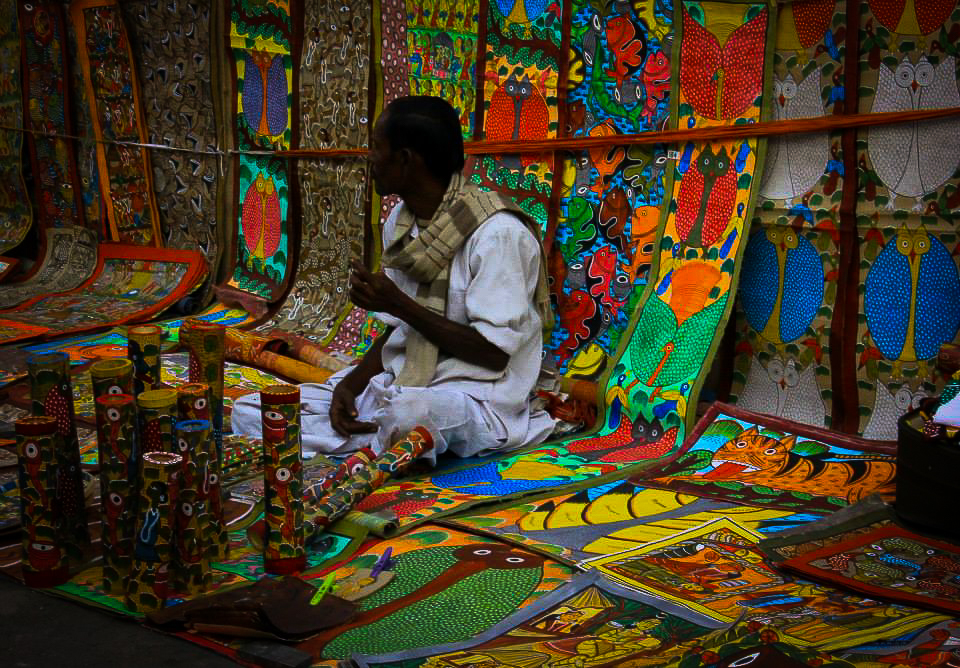“He who works with his hands is a laborer.
He who works with his hands and his head is a craftsman.
He who works with his hands and his head and his heart is an artist.”
― Saint Francis of Assisi

The knife-sharpening man. I love his hair
Table of Contents
Do you have workers in your city?
This post is dedicated to the working people of Kolkata. When I say working people, I am biased because this term encompasses many other professions like accountants, businesspeople, doctors, architects, etc. What I mean are the toilers of Kolkata – people who spend their entire adult years doing something that many from Western countries find absolutely outlandish and worst still, (horror – o – horror) inhuman. For example, do you have a goat herder in Melbourne or a street shoe polisher in London? Has Frankfurt got a knife sharpener man or can New York City boast of a spotlessly dapper and dashing street barber who does his business on the pavements? And most importantly, do you have homeless in your city, citizens whose entire belongings are spread in a tent under a bridge, soup shelters, or people who rummage through garbage for ‘recycle for pennies’ bottles? I wonder why that doesn’t come across as ‘inhuman’. During my travels, my stays, and interactions with people from more ‘civilized’ countries, I have often come across absolutely gullible, hypocritical, and silly comments about the working people of India. These comments range from ‘oh those poor exploited people’, ‘that’s horrible’ to ‘that’s human rights violation’, etc.

The smiling street barber and his dapper style
A rickshaw puller is a rickshaw-puller
While I do not deny the existence of these conditions in some places in India, most blue-collared workers are doing what they have learned to do, or are good at. In short, they are WORKING (respect that). Since, I am from Calcutta – the city with rickshaws – for a long time, I had tried to explain the reason behind their existence and the fact that, if these are taken away, these rickshaw pullers will be doing something equally physically laborious. It often turned out that these so-called civilized people had more problems with humans bearing other humans rather than the job itself and I was nearly getting swayed by the force of their opinions, when one day, I saw a German man bearing another human being right in the middle of Cologne. He was a glorified rickshaw puller who was ferrying tourists around the historic heart of the city in his ‘eco-friendly vehicle’.

The rickshaw pullers of Calcutta
Colonialism never ends
Imagine my indignation and rage at all those bigots who have until now been turning up their noses at our hard-working rickshaw pullers only to steal the idea and make money out of it. There have also been instants of really silly women complaining and feigning horror at Indian households having maids while at the same time applying for ‘Aushilfe Gesucht – Household Help Wanted’ ads. So, where does the difference lie in having a maid or employing an aushilfe, I don’t know except perhaps the ‘Aushilfe’ are (sometimes after bargaining) paid according to their country’s wage regulations while we pay our maids according to the ongoing rates. Moreover, these are the same very self-righteous concerned women who rush to buy fashion items from companies that are criticized for exploiting human rights conditions in other countries. Colonialism never ends, I suppose.

The fruit seller
This is for the city’s unsung heroes – its workers
Anyway, these revelations made me realize and appreciate the efforts these city ‘ants’ (and I mean it in a respectful way) put in every day in doing something that makes our lives better in some ways. They clean, carry, move, break, build, create, shop, sell, cook, and bake. To be honest, if given the chance or opportunity, would these people opt to do something else – something better? Most probably yes and they are also toiling so that their children are better educated and have better chances in life than them. No matter what pathos their lives have, these city workers get up every day, spruce themselves up, and go about their work which doesn’t bring them up except just tide things over, looking efficient and dapper. They are barbers, shoemakers, rickshaw pullers, butchers, small businessmen, vegetable peddlers, housemaids, etc. While I am not glorifying the working conditions in India in this post, I am simply showcasing the workers of my city and the jobs they do.
“No man needs sympathy because he has to work, because he has a burden to carry. Far and away the best prize that life offers is the chance to work hard at work worth doing.”
― Theodore Roosevelt

The traditional miller

A tea-maker who has perfected his art

This man has a hole in the wall shop and sells spark plus

A tobacco seller

The radio and television sets repair man

This man delivers water

A local housemaid

This man has a small shop where he sells fried fritters and chips

The street food shop

The street tobacconist

The accountant whom we locally call ‘munshi’

The Chinese food sellers at the Tiretti market

The pavement shoe-repair shop

The wood choppers

The flower seller

One of the famous clay idol artisans of Calcutta

Street food sellers in Calcutta

A neighbourhood grocer

A vendor at a local market

Finally, the famous Puchka seller of Calcutta
Follow the rest of the Calcutta series
- THINGS TO DO IN KOLKATA
- THIS IS KATHLEEN’S KOLKATA
- CALCUTTA THROUGH BRIAN’S EYES
- BRIAN’S CALCUTTA NOT KOLKATA
- THIS IS MY CALCUTTA
- CALCUTTA, MEMORIES OF A WAY OF LIFE
- CALCUTTA FOOD
- BOW BARRACKS CHRISTMAS OF CALCUTTA
- QUIRKS OF CALCUTTA
- KOLKATA’S UNSUNG MEMOIRS
- KOLKATA PHOTO ESSAY
- CALCUTTA LOVES TO READ: A PHOTO ESSAY
RESPONSIBLE TRAVELING-BECAUSE I CARE

